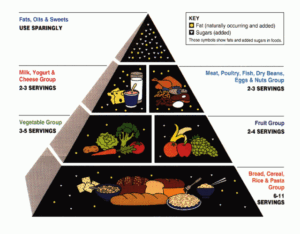Introduction to Power of Food:
We’ve all heard the saying, “You are what you eat.” And while it may sound cliché, there’s a profound truth to it. The food we consume plays a pivotal role in our overall health and well-being. In fact, making mindful choices about what we eat can have a transformative impact on our lives. In this article, we’ll delve into the power of food, exploring how the right nutrition can improve your health, boost your energy levels, and enhance your quality of life. So, get ready to embark on a journey of culinary discovery and unlock the potential of optimal nutrition.
1. Fueling Your Body with Nutrients:

Food is more than mere sustenance; it’s the fuel that powers our bodies. The nutrients we obtain from our diet are essential for growth, repair, and the proper functioning of our bodily systems. A balanced diet rich in vitamins, minerals, protein, healthy fats, and carbohydrates can provide the necessary nourishment for optimal health. By choosing nutrient-dense foods, you can support your immune system, improve your digestion, and enhance your body’s ability to ward off diseases.
The Importance of a Balanced Diet
A balanced diet consists of a variety of foods that provide a wide range of essential nutrients. These include vitamins, minerals, protein, healthy fats, and carbohydrates. Each nutrient plays a unique role in supporting various bodily functions, such as growth, repair, and energy production.
Nourishing Your Body for Optimal Health

By consuming a nutrient-dense diet, you can provide your body with the necessary tools for optimal health.
- Vitamins and minerals support immune function, help regulate bodily processes, and protect against diseases.
- Protein is essential for muscle growth, repair, and the production of enzymes and hormones.
- Healthy fats are crucial for brain health, hormone balance, and the absorption of fat-soluble vitamins.
- Carbohydrates serve as the primary source of energy for your body and brain.
Supporting Your Immune System
A well-nourished body is better equipped to fight off infections and diseases. Essential nutrients, such as vitamin C, vitamin D, zinc, and antioxidants found in fruits, vegetables, and whole grains, support a robust immune system. By incorporating these foods into your diet, you can strengthen your body’s defenses and reduce the risk of illness.
Enhancing Digestion and Nutrient Absorption
A balanced diet rich in fiber promotes a healthy digestive system. Fiber aids in maintaining regular bowel movements, preventing constipation, and supporting a diverse and beneficial gut microbiome. This, in turn, enhances nutrient absorption, as a healthy gut environment allows for better uptake of vitamins, minerals, and other essential nutrients from the foods you consume.
Warding off Diseases and Promoting Longevity
Proper nutrition plays a significant role in disease prevention. A diet rich in fruits, vegetables, whole grains, lean proteins, and healthy fats has been associated with a lower risk of chronic conditions such as heart disease, diabetes, and certain types of cancer. By nourishing your body with wholesome foods, you can improve your chances of leading a long and healthy life.
Food is not just a source of calories; it serves as the fuel that powers our bodies and supports our overall health and well-being. Here’s a closer look at how obtaining essential nutrients through a balanced diet can optimize your body’s functions and enhance your vitality.
2. Harnessing the Healing Properties of Food:
Believe it or not, certain foods possess remarkable healing properties. From antioxidant-rich fruits and vegetables that combat inflammation to probiotics that promote gut health, nature has provided us with an abundant array of wholesome foods that can work wonders for our bodies. By incorporating these healing foods into your diet, you can reduce the risk of chronic conditions, such as heart disease, diabetes, and certain cancers. Embracing a plant-based diet, for example, has been associated with numerous health benefits and longevity.
3. Boosting Energy and Mental Well-being:

Ever experienced that mid-afternoon energy slump? The food we consume has a direct impact on our energy levels and mental well-being. Highly processed foods high in added sugars and unhealthy fats can cause energy crashes and mood swings. On the other hand, whole foods, such as fruits, vegetables, whole grains, and lean proteins, provide sustained energy, improve focus, and stabilize mood. By making wholesome food choices, you can fuel your body and mind for optimal performance throughout the day.
4. Cultivating Healthy Eating Habits:

Eating well is not just about individual food choices; it’s about establishing healthy eating habits. Mindful eating, which involves savoring and being present during meals, can help you become more attuned to your body’s hunger and fullness cues. Additionally, practicing portion control, avoiding emotional eating, and embracing a balanced approach to eating can foster a healthy relationship with food and promote long-term well-being.
5. Tailoring Your Diet to Your Individual Needs:
It’s important to note that each person’s dietary needs may vary based on factors such as
- age
- sex
- activity level
- underlying health conditions.
Consulting with a registered dietitian or nutritionist can provide personalized guidance to help you optimize your nutrition and meet your specific health goals.
Here are some of the ways that what you eat can affect your health:
- Weight management: Eating a healthy diet can help you maintain a healthy weight or lose weight if you need to. When you eat a variety of nutrient-rich foods, you are less likely to overeat or crave unhealthy foods.
- Reduced risk of chronic diseases: A healthy diet can help reduce your risk of developing chronic diseases such as heart disease, stroke, type 2 diabetes, and some types of cancer. These diseases are often caused by unhealthy lifestyle factors, such as poor diet, smoking, and lack of physical activity.
- Improved overall well-being: Eating a healthy diet can also improve your overall well-being. You may have more energy, feel better about yourself, and have a stronger immune system.
Here are some tips for eating a healthy diet:

- Eat plenty of fruits and vegetables. Fruits and vegetables are packed with vitamins, minerals, and fiber, which are essential for good health. Aim to eat at least five servings of fruits and vegetables per day.
- Choose whole grains over refined grains. Whole grains are a good source of fiber and other nutrients. Choose whole-wheat bread, brown rice, and quinoa instead of white bread, white rice, and pasta.
- Lean protein. Lean protein is a good source of protein, which is essential for building and maintaining muscle mass. Choose lean protein sources such as chicken, fish, beans, and lentils.
- Healthy fats. Healthy fats are essential for good health. Choose healthy fat sources such as olive oil, avocado, and nuts.
- Limit unhealthy fats. Unhealthy fats, such as saturated and trans fats, can increase your risk of chronic diseases. Limit your intake of unhealthy fats by choosing lean protein sources, cooking with healthy oils, and avoiding processed foods.
- Drink plenty of water. Water is essential for good health. Aim to drink eight glasses of water per day.
Conclusion:
Food holds incredible power. By making conscious choices about what we eat, we can harness the potential of nutrition to improve our health, vitality, and overall quality of life. Fuel your body with nutrient-dense foods, embrace the healing properties of wholesome ingredients, and cultivate healthy eating habits. Remember, it’s never too late to embark on a journey toward optimal nutrition. Let the power of food be your ally in achieving a vibrant, well-nourished existence.
You can also incorporate supplement to your food. Try Field of Greens, a revolutionary superfood powder. You can also checkout benefits of Field of Greens in our descriptive blog.









[…] can also read our blog about power of food, healthy habits that will surely help you to start your journey of healthy life step by […]